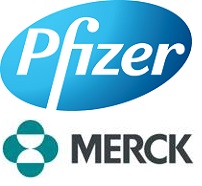Two American pharmaceutical giants reported earnings this morning, both showing flagging sales - but one ended the day with a gain.
 Merck & Co. Inc. (NYSE: MRK) shares gained 1.05% to close at $58.58 while Pfizer Inc. (NYSE: PFE) stock fell 1.23% to $29.73.
Merck & Co. Inc. (NYSE: MRK) shares gained 1.05% to close at $58.58 while Pfizer Inc. (NYSE: PFE) stock fell 1.23% to $29.73.
In its second-quarter earnings report, Pfizer - the world's largest pharmaceutical firm - reported revenue of $12.8 billion, down from last year's nearly $13 billion mark but above estimates of $12.46 billion. Earnings were down from 2013's second-quarter figure of $14.1 billion all the way to $2.9 billion for earnings per share (EPS) of $0.58.
MRK sales were down a slight 0.7% to $10.9 billion from last year's $11 billion, though sales dropped a lot less than the 3.7% estimated slump that analysts predicted. Profits were up 121.2%, up to $2 billion from $906 million last year, for an EPS of $0.68, below estimates of $0.81.
Both firms also reported progress on regulatory approval for cancer drugs.
PFE expects to complete its new drug application for an advanced breast cancer treatment, palbociclib, by August, and MRK announced that U.S. and European regulatory officials accepted applications for a melanoma drug, pembrolizumab.
And amid a busy M&A year for the healthcare sector, both PFE and MRK grabbed headlines on potential big ticket deals, although for different reasons....
PFE's Failed Bid for AstraZeneca
The biggest second-quarter news was PFE's renewed discussions to acquire British-Swedish pharmaceutical company AstraZeneca Plc. (NYSE ADR: AZN) - marketers of such drugs as Crestor, Entocort, and Nexium - which were initially rejected in January. On May 18, PFE made a final offer to acquire AZN, but the AZN board voted it down and PFE dropped its bid to buy the company.
"We continue to believe that our final proposal was compelling and represented full value for AstraZeneca based on the information that was available to us," Ian Read, chairman and CEO of PFE said in a May press release. "As we said from the start, the pursuit of this transaction was a potential enhancement to our existing strategy."
From PFE's April announcement of renewed merger talks to AZN's rejection, PFE shares dropped 7.6%. Disagreements arose over the valuation of AZN, which PFE priced at around $119 billion.
"Pfizer's approach throughout its pursuit of AstraZeneca appears to have been fundamentally driven by the corporate financial benefits to its shareholders of cost savings and tax [minimization]," Leif Johansson, chairman of AZN said in a statement in May. "As an independent company, the entire value of AstraZeneca's pipeline will accrue to our shareholders. Under Pfizer's Final Proposal, this value would be significantly diluted."
Some analysts believed that PFE introduced a fair proposal, and were stunned by AZN's rejection and the disputes that arose over valuation and shareholder benefits.
"We are surprised by Astra's rejection," Damien Conover, an analyst at Morningstar wrote in an analyst note after the rejected bid. "We believe the offer not only rewards Astra for its current valuation, but also gives Astra shareholders a majority of the benefits from the expected merger-related cost savings."
Meanwhile, Merck had better luck with M&A in Q2...
MRK Makes Smart Moves in Q2
In May, MRK announced that it would sell its over-the-counter business that includes the global trademark and prescription rights to signature MRK drugs, Claritin and Afrin, to German drugmaker Bayer AG for $14.2 billion.
"This acquisition marks a major milestone on our path towards global leadership in the attractive non-prescription medicines business," said Bayer CEO Marijn Dekkers in a company press release. "At the same time we are leveraging our capabilities in the cardiovascular therapeutic area."
MRK also agreed to pay Bayer $1 billion in a global co-development and co-commercialization agreement concerning soluble guanylate cyclase modulators.
In addition to its Bayer deal, MRK announced in the second quarter its intention to buy Idenix Pharmaceuticals Inc. (Nasdaq: IDIX), a mid-cap pharmaceutical company that has seen its shares grow a remarkable 306.7% since the beginning of the year, for $3.85 billion. The deal is expected to close on August 4.
Expectations for the Biopharma Giants
Despite both healthcare companies seeing flat to declining sales growth in an industry that drew criticism earlier this month from U.S. Federal Reserve Chairwomen Janet Yellen, who said equities in the biotech sector were experiencing "stretched valuations," Money Morning BioScience Investment Specialist Ernie Tremblay said he thinks "there's plenty to be confident of in biotech."
"They're delivering real products for real value and they're delivering a real need," Tremblay said.
And while most of the uneasiness in the biotech and healthcare sector comes from small-cap firms, MRK and PFE are by far the industry's heavyweights, way more established than the often cash-burning biopharma small-caps.
Conover of Morningstar sees a promising road ahead for MRK, despite this flat earnings season.
"Merck's combination of a wide lineup of high-margin drugs and a pipeline of new drugs should ensure strong returns on invested capital over the long term," Conover wrote.
And PFE, with its size and wide array of assets gives it "the largest economy of scale in the pharmaceutical industry," Conover writes.
"Pfizer's foundation remains solid, based on strong cash flows generated from a basket of diverse drugs," Conover writes. "The company's large size confers significant competitive advantages in developing new drugs. This unmatched heft, combined with a broad portfolio of patent-protected drugs, has helped Pfizer build a wide economic moat around its business."
More from Ernie Tremblay: As people get older, they get sicker, and with the elderly population set to double by 2030, bioscience investors have a huge opportunity to profit...


